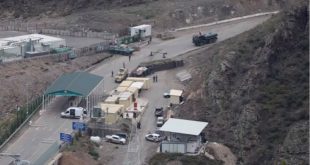US President Donald Trump on Saturday proposed a weekend meeting with Kim Jong Un at the demilitarized zone (DMZ) between North and South Korea, an encounter North Korea said would be meaningful if it goes ahead.
If Trump and Kim do meet, it will be for the third time in just over a year, and four months after their second summit broke down with no progress on U.S. efforts to get North Korea to give up its nuclear weapons.
North Korea said it had not had an official proposal.
Trump made the offer in a tweet about his trip to South Korea, where he landed on Saturday after the Group of 20 summit in Osaka, Japan.
“While there, if Chairman Kim of North Korea sees this, I would meet him at the Border/DMZ just to shake his hand and say Hello(?)!” Trump said, later telling reporters his offer was spontaneous: “I just thought of it this morning.”
“If he’s there, we’ll see each other for two minutes, that’s all we can, but that will be fine,” he said, adding that he and Kim “get along very well”.
About five hours after Trump’s tweet, the state news agency KCNA quoted Choe Son Hui, North Korea’s first vice-minister of foreign affairs, as saying: “We see it as a very interesting suggestion, but we have not received an official proposal.”
“If the DPRK-US summit meetings take place on the division line, as is intended by Trump, it would serve as another meaningful occasion in further deepening the personal relations between the two leaders and advancing the bilateral relations,” Choe said in a statement.
She was referring to North Korea by its official name – the Democratic People’s Republic of Korea.
Later, Trump told a news conference: “We may be meeting with Chairman Kim … Kim Jong Un was very receptive.”
He added, “We won’t call it a summit. We’ll call it a handshake”, and said he would be very comfortable stepping over the border into North Korea if he met Kim at the DMZ.
After arriving in Seoul, Trump was asked whether there would be a three-way meeting with Kim and South Korean President Moon Jae-in on Sunday. “We’re working things out right now,” he said. “We’re going to see.”
At dinner with Trump, Moon said: “If it happens as described in the Twitter message, it will be a historic event and, if it doesn’t, I think it’s a great achievement in its own right because President Trump showed great consideration to Chairman Kim Jong Un.”
U.S. special envoy Stephen Biegun said on Friday the United States was ready to hold constructive talks with North Korea to follow through on a denuclearization agreement they reached last year, South Korea’s foreign ministry said.
Biegun told his South Korean counterpart, Lee Do-hoon, that Washington wanted to make “simultaneous, parallel” progress on the agreement reached at Trump-Kim summit in Singapore a year ago, the ministry said in a statement.
Both sides had agreed to rebuild relations and work toward de-nuclearization of the Korean peninsula, but talks stalled in February as they failed to narrow differences between U.S. calls for denuclearization and North Korean demands for sanctions relief.
South Korea’s presidential office said a Trump-Kim meeting had not been confirmed.
It added that Russian President Vladimir Putin had told Moon at the G20 summit that Kim had told him in April security guarantees were key and that corresponding measures were needed to realize denuclearization.
Trump had wanted to visit the DMZ on a 2017 visit to South Korea but bad weather prevented it.
U.S. Secretary of State Mike Pompeo said this week that a recent exchange of letters between Trump and Kim had made a restart of talks a “very real possibility”.
Trump told reporters on Saturday that Kim had sent him a birthday card and Trump wrote back.
North Korea’s official KCNA news agency said Trump’s letter had “excellent content” and Kim would “seriously contemplate” it, without elaborating.
Harry J. Kazianis of the Center for the National Interest said that “President Trump made his pitch for a short summit with Chairman Kim on Twitter as White House officials most likely have tried – and failed – to set up such a meeting through official diplomatic or South Korean channels”.
“While no major agreements will be signed, both sides can reaffirm their commitment to dialogue and diplomacy, essentially resetting the table for a future deal.”
But other analysts were more skeptical.
“The fundamental problem – no working-level meetings and no basic change in at least the US negotiating position – means that any meeting right now is just pointless theater,” tweeted Vipin Narang, an MIT professor of political science.
 Alghadeer TV Alghadeer TV
Alghadeer TV Alghadeer TV
